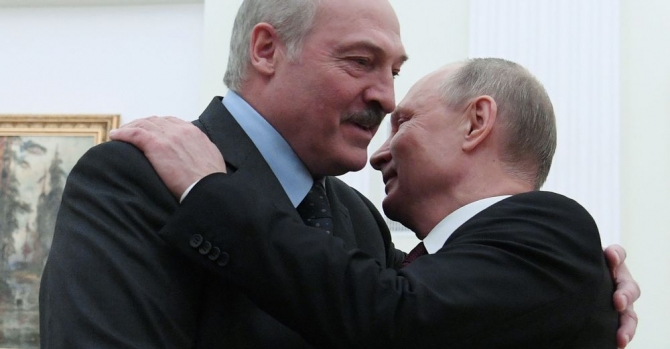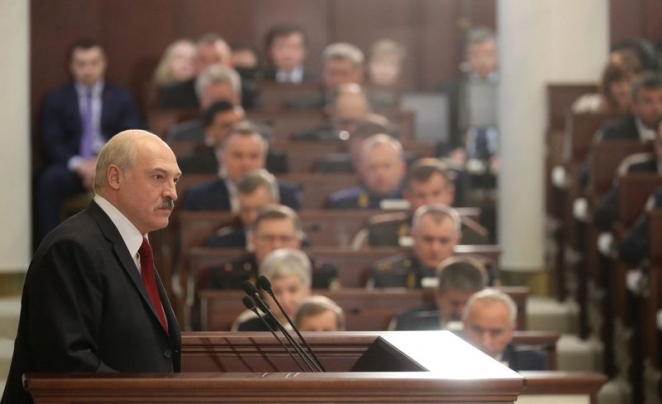Putin’s Term Limit Stirs Fears of a Takeover in Belarus
By Henry Meyer, Aliaksandr Kudrytski, and Ilya Arkhipov, Bloomberg
25 April 2019, 10:49
 President Vladimir Putin may look beyond Russia for a mechanism to keep power after his current term ends. That’s making Moscow’s closest ally nervous amid spiraling tensions over Kremlin threats to slash economic subsidies.
President Vladimir Putin may look beyond Russia for a mechanism to keep power after his current term ends. That’s making Moscow’s closest ally nervous amid spiraling tensions over Kremlin threats to slash economic subsidies.
After years of spending billions of dollars to support Belarus’s state-dominated economy, Russia is intensifying pressure on President Alexander Lukashenko to demonstrate his loyalty by accepting deeper integration in return for continued aid. That’s fueling fears in Belarus that Russia’s turning the screw as a prelude to possible absorption of its former Soviet satellite.
Those concerns may not be unfounded, according to three people close to the Kremlin, who said Putin may lay plans to head a unified state with neighboring Belarus to sidestep a constitutional ban on remaining president after 2024.
While no decision has been taken on seeking a merger, which would risk opposition in both Russia and Belarus, Putin is increasingly impatient with Lukashenko and concerned he may try to slip out of Moscow’s orbit, said the people, who requested anonymity discussing such a sensitive issue.
Already the longest-serving Russian leader since dictator Josef Stalin, Putin, 66, has repeatedly ruled out changing constitutional term limits to extend his rule. While he’s given no public indication of his plans beyond 2024, Kremlin officials are studying potential methods of keeping him in power. They include emulating Kazakh leader Nursultan Nazarbayev’s decision last month to step down as president while retaining political control, though analysts in Moscow are skeptical such a maneuver would work in Russia.
“That’s why Belarus is important because it’s one of the possible solutions,” said former Kremlin political consultant Gleb Pavlovsky.
‘Union State’
Largely dependent on Russian oil and gas supplies, Lukashenko’s feeling the pressure from new tax rules introduced by Moscow that he says may lead to nearly $11 billion in losses for Belarus by 2024 through increased crude costs.
“I understand those hints: here’s your oil, but you must destroy your country and join Russia,” Lukashenko said in December. Some officials in Moscow “say directly” that they want to incorporate Belarus into Russia in return for financial assistance, he said.
Though he signed a 1999 agreement to form a “union state” with Russia, Lukashenko has rebuffed demands to agree to a monetary union, single legal system and common foreign and security policy as a price for keeping the lifeline of economic benefits that Moscow estimates at about $6 billion a year. Belarus rejects the idea that the support amounts to charity, regarding it as the fruit of economic integration between the two countries.
‘Economic Shock’
Russia has the ability to inflict a “significant economic shock” on Belarus, said Dzmitry Kruk, a researcher at Minsk-based private think tank BEROC.
Lukashenko, 64, whom the U.S. once dubbed the “last dictator in Europe,” has ruled his nation of about 10 million with an iron fist since 1994, and plans to seek a new five-year term in 2020.
While routinely declaring a fraternal bond with Russia, he’s often sought to keep some distance by reaching out to the European Union, China and neighboring Ukraine to try to balance Moscow’s influence. It’s possible the Kremlin is floating talk of a takeover now as a means of leverage to push Lukashenko into making further concessions.
Belarus hosts a Russian early-warning radar and a naval communications center, for instance, though it has so far resisted pressure from Moscow to permit a new military base on its territory.
Raised Hackles
Underlining the tensions, Lukashenko warned a security conference in Minsk late last year attended by the Polish foreign minister and other top officials that western military expansion close to Russia’s borders was pushing Belarus into the Kremlin’s arms, according to two people who attended the meeting.
Russia’s ambassador to Belarus has also raised hackles with comments tying continued financial support to closer integration, prompting the foreign ministry spokesman in Minsk to remark in March that the envoy “simply hasn’t understood the difference between a Russian federal district and an independent state.”
The ministry last week stepped up its criticism of Mikhail Babich, a former KGB officer with military experience. While outside powers had for decades “tried unsuccessfully to destroy the close and friendly relations” between Belarus and Russia, the feat was being “successfully and effectively managed by Mr. Babich in just a few months,” it said in a statement.
In an April 19 speech, Lukashenko vowed “a very powerful response” to any outside attempt to force Belarus into surrendering its independence. In March, he said that “98% would vote against” in a referendum on Belarus joining Russia, while also ruling out any prospect of holding such a plebiscite.
“The probability of such a scenario -- the unification of Belarus and Russia into one state under Putin -- is low but should not be dismissed,” said Andrei Yeliseyeu, research director at EAST Center, a Warsaw-based think-tank.
Russia increased the pressure last week by banning apples and pears from Belarus, saying it suspected the fruit originated in countries subject to Moscow’s ban on European food imports. Lukashenko compared Russia’s action to imposing sanctions and threatened to close Russian oil pipelines across Belarus for maintenance.
“They have become so brazen that they’ve begun twisting our arms,” he said.
— With assistance by Irina Reznik, and Evgenia Pismennaya
25 April 2019, 10:49

Vladimir Putin and Alexander Lukashenko Photographer: KIRILL KUDRYAVTSEV/AFP/Getty Images
After years of spending billions of dollars to support Belarus’s state-dominated economy, Russia is intensifying pressure on President Alexander Lukashenko to demonstrate his loyalty by accepting deeper integration in return for continued aid. That’s fueling fears in Belarus that Russia’s turning the screw as a prelude to possible absorption of its former Soviet satellite.
Those concerns may not be unfounded, according to three people close to the Kremlin, who said Putin may lay plans to head a unified state with neighboring Belarus to sidestep a constitutional ban on remaining president after 2024.
While no decision has been taken on seeking a merger, which would risk opposition in both Russia and Belarus, Putin is increasingly impatient with Lukashenko and concerned he may try to slip out of Moscow’s orbit, said the people, who requested anonymity discussing such a sensitive issue.
Already the longest-serving Russian leader since dictator Josef Stalin, Putin, 66, has repeatedly ruled out changing constitutional term limits to extend his rule. While he’s given no public indication of his plans beyond 2024, Kremlin officials are studying potential methods of keeping him in power. They include emulating Kazakh leader Nursultan Nazarbayev’s decision last month to step down as president while retaining political control, though analysts in Moscow are skeptical such a maneuver would work in Russia.
“That’s why Belarus is important because it’s one of the possible solutions,” said former Kremlin political consultant Gleb Pavlovsky.
‘Union State’
Largely dependent on Russian oil and gas supplies, Lukashenko’s feeling the pressure from new tax rules introduced by Moscow that he says may lead to nearly $11 billion in losses for Belarus by 2024 through increased crude costs.
“I understand those hints: here’s your oil, but you must destroy your country and join Russia,” Lukashenko said in December. Some officials in Moscow “say directly” that they want to incorporate Belarus into Russia in return for financial assistance, he said.
Though he signed a 1999 agreement to form a “union state” with Russia, Lukashenko has rebuffed demands to agree to a monetary union, single legal system and common foreign and security policy as a price for keeping the lifeline of economic benefits that Moscow estimates at about $6 billion a year. Belarus rejects the idea that the support amounts to charity, regarding it as the fruit of economic integration between the two countries.
‘Economic Shock’
Russia has the ability to inflict a “significant economic shock” on Belarus, said Dzmitry Kruk, a researcher at Minsk-based private think tank BEROC.
Lukashenko, 64, whom the U.S. once dubbed the “last dictator in Europe,” has ruled his nation of about 10 million with an iron fist since 1994, and plans to seek a new five-year term in 2020.
Alexander LukashenkoPhotographer: NIKOLAY PETROV/AFP/Getty Images
While routinely declaring a fraternal bond with Russia, he’s often sought to keep some distance by reaching out to the European Union, China and neighboring Ukraine to try to balance Moscow’s influence. It’s possible the Kremlin is floating talk of a takeover now as a means of leverage to push Lukashenko into making further concessions.
Belarus hosts a Russian early-warning radar and a naval communications center, for instance, though it has so far resisted pressure from Moscow to permit a new military base on its territory.
Raised Hackles
Underlining the tensions, Lukashenko warned a security conference in Minsk late last year attended by the Polish foreign minister and other top officials that western military expansion close to Russia’s borders was pushing Belarus into the Kremlin’s arms, according to two people who attended the meeting.
Russia’s ambassador to Belarus has also raised hackles with comments tying continued financial support to closer integration, prompting the foreign ministry spokesman in Minsk to remark in March that the envoy “simply hasn’t understood the difference between a Russian federal district and an independent state.”
The ministry last week stepped up its criticism of Mikhail Babich, a former KGB officer with military experience. While outside powers had for decades “tried unsuccessfully to destroy the close and friendly relations” between Belarus and Russia, the feat was being “successfully and effectively managed by Mr. Babich in just a few months,” it said in a statement.
In an April 19 speech, Lukashenko vowed “a very powerful response” to any outside attempt to force Belarus into surrendering its independence. In March, he said that “98% would vote against” in a referendum on Belarus joining Russia, while also ruling out any prospect of holding such a plebiscite.
“The probability of such a scenario -- the unification of Belarus and Russia into one state under Putin -- is low but should not be dismissed,” said Andrei Yeliseyeu, research director at EAST Center, a Warsaw-based think-tank.
Russia increased the pressure last week by banning apples and pears from Belarus, saying it suspected the fruit originated in countries subject to Moscow’s ban on European food imports. Lukashenko compared Russia’s action to imposing sanctions and threatened to close Russian oil pipelines across Belarus for maintenance.
“They have become so brazen that they’ve begun twisting our arms,” he said.
— With assistance by Irina Reznik, and Evgenia Pismennaya


